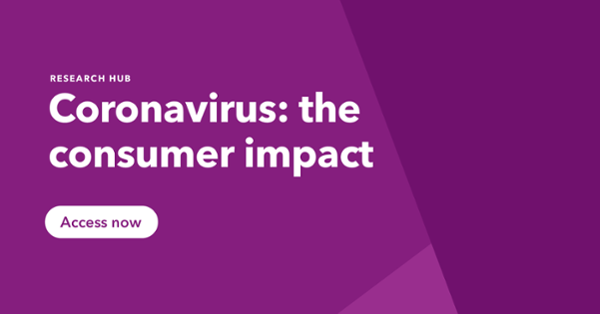March 2020 saw private payrolls plummet by 713,000 in the U.S., ending a record 113 consecutive months of job growth.
In the UK, analysts from the Centre for Economics and Business Research (CEBR) have predicted that the coronavirus pandemic could cause UK economic output to plunge by an unprecedented 15% in Q2. A contraction which would dwarf the fourth quarter of 2008’s 2.2% as the banking crash took hold.
A significant economic effect for many
For 1 in 5 internet users in the U.S. and UK, the coronavirus outbreak has had a major effect on their ability to regularly earn money.
This rises to 26% for Gen Z and then decreases steadily for older generations: 22% of millennials, 19% of Gen X, and 13% of baby boomers.
Among those in the top 25% income bracket, just 14% report being majorly affected – however this rises to 25% of those in the bottom 25% income bracket.
Such insights provide compelling evidence that young people and low earners are set to suffer most financially as a result of the pandemic.
Collectively, the coronavirus outbreak has either majorly or moderately affected 46% of U.S. consumers’ abilities to regularly earn money. In the UK however, this figure stands at just 35%.
In the U.S. lawmakers have passed the $2.3 trillion CARES Act, while in the U.K. the government has launched its furlough scheme.
You can see a full breakdown of the U.S. and UK’s economic responses here.
Economic confidence: the demographic breakdown
To analyze how economically confident consumers in the U.S. and UK are, we asked them how quickly they think the global economy, their country’s economy, and their personal finances will take to fully recover once the coronavirus outbreak is over.
Over half of consumers in the U.S. and UK expect the global economy (58%), or their country’s economy (51%), to recover moderately or extremely slowly.
However, when it comes to personal finances, just 34% feel the same.
Ultimately, confidence in the economy as a whole, is far lower than consumers’ confidence in themselves to overcome the inevitable economic challenges of coronavirus. This is in line with our international research on coronavirus which found people tend to believe the collective situation is worse than their own individual situation.
Economic confidence is higher in the U.S.
% of internet users who think the following will recover moderately/very fast once the coronavirus outbreak is over
| U.S. | UK | |
| The Global Economy | 13% | 9% |
| Your Country’s Economy | 19% | 10% |
| Your Personal Finances | 16% | 11% |
As the table above shows, across all three criteria, consumers in the U.S. are more economically confident than those in the UK.
This is despite the fact that a greater majority of U.S. consumers report that the pandemic has impacted their ability to regularly earn money.
Interestingly, the greatest cross-country difference is found when consumers are asked to rating their own country’s economy. Suggesting that U.S. consumers are significantly more confident in their economy than their respective UK counterparts.
It’s worth noting that financial position before the crisis has a negligible effect on country specific confidence.
Among U.S. and UK consumers who say they usually struggle to make ends meet, 53% expect their country’s economy to recover slowly, while for consumers who are financially secure, this is actually slightly higher at 55%.
Women are significantly less likely (11%) to think that their personal finances will recover quickly after the outbreak than men (19%).
In summary, while economic confidence is partially affected by gender, age, and income; coronavirus poses an unprecedented economic challenge to all of society.



